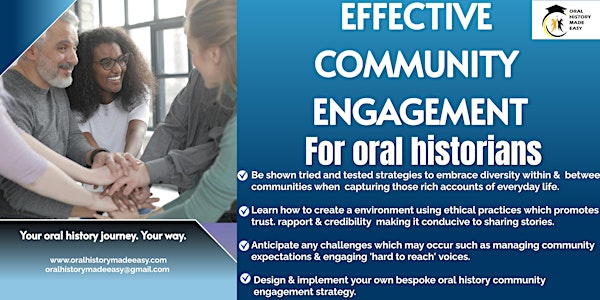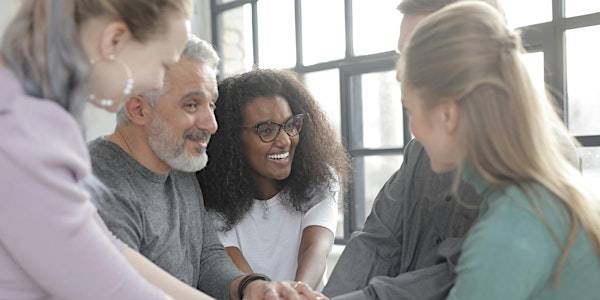



Engaging Communities In Oral History
How can we engage communities meaningfully in our oral history projects? What safeguards can we implement to ensure we are acting ethically?
Date and time
Location
Online
Refund Policy
Agenda
10:00 AM - 10:30 AM
Embracing diversity through oral history: top tips for success.
10:30 AM - 11:00 AM
The embedding of ethical practices in your community oral history project.
11:00 AM - 11:30 AM
How to anticipate and address challenges ahead e.g. managing expectations.
11:30 AM - 12:00 PM
Moving from ‘involvement’ to ‘engagement:’ stakeholdership in oral history.
12:00 PM - 1:00 PM
Design & implement your own community engagement strategy. Q & A. Plenary.
About this event
How can we engage communities meaningfully in our oral history projects? What safeguards do we need to ensure we are acting ethically at all stages of our community oral history project? And what frameworks can we use to ensure we pre-empt and meet challenges when undertaking community oral history projects?
Oral history is a people’s history and oral historians play a crucial role in preserving and disseminating the rich tapestry of human experiences that lie hidden in our communities. Moreover, oral historians who engage ethically and effectively with women and men in their communities elevate their craft and are likely to be given longer term access to that group and with it, access to their ever evolving stories. Yet those engaged with oral history often lack the skills and knowledge needed to maximise the opportunities at their disposal to gather those rich and diverse narratives of the past.
‘Effective Community Engagement For Oral Historians: Strategies For Success’ is designed exclusively for oral historians at all levels of their careers to safeguard ethical and effective community engagement. The session will break effective community engagement down into five easy to follow integrated and actionable steps which promote inclusivity at each stage of the process.
By the end of the workshop, participants will have learnt how to:
1.Embrace Diversity by implementing tried and tested strategies which recognise diversity within and between physical and online communities to safeguard inclusivity and respect for diverse cultural practices.
2.Embed Ethical Practices which promote trust, rapport and credibility so that you, as the oral historian, can create a research environment conducive to sharing stories. The importance of obtaining consent, recording, archiving and disseminating of interviews and how positionality shapes engagement with interviewees and any gatekeeping organisation with whom the oral historian may work.
3. Pre-empt any challenges which may occur such as managing community expectations and dynamics; explore the importance of framing of questions to recognise cultural and community sensitivities; tips on recruiting and debriefing participants, ensuring ‘hard to reach’ voices are encouraged participating in your oral history project and practicalities of recording.
4. Move from low level ‘involvement’ to meaningful ‘engagement’ with diverse groups women and men in any given community to foster a sense of ownership of and stakeholdership in the oral history project longer term.
5. Design and implement your own bespoke community engagement strategy using tried and tested interrelated principles of project management, collaborative working and critical evaluation.
6. Create a personal professional developmental action plan to ensure you, as the lead oral historian, realise your strategic goals both with any given community organisation and individually as an oral historian as your oral history practice moves to the next stages of development.
All participants will be invited to share their proposed community oral history projects with the workshop facilitator Dr Angela Maye-Banbury in advance of the workshop to ensure leaners’ needs are met in the session.
This course is suitable for:
Anyone who is involved in an oral history project with a physical and/or online community. This includes:
Students doing oral history related research as part of undergraduate, masters and PhD degrees or other academic programmes of study.
Any community groups who is involved in an oral history project as either a standalone project or part of wider series of oral projects e.g. regional or national initiatives.
Anyone working in the statutory and voluntary heritage sector who has an interest in oral history.
Volunteers interested in developing a community level oral history project.
Duration:
Three hours online delivered on Zoom.
Cost
€39
Attendance mode
Online on Zoom with the link sent two days before the event.